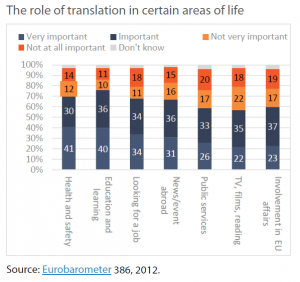Six EU official languages – English, German, French, Italian, Spanish and Polish – are the mother tongues spoken by the largest groups of EU citizens, while English, German, French and Spanish are the most popular foreign languages in the EU. Nevertheless, 15 % of citizens, representing more than half the population of 11 Member States, do not speak any of them. In such situations, translation is one way of overcoming language barriers for citizens and businesses operating in the European single market and particularly in the digital single market. The 2012 Eurobarometer 386 survey showed that translation enjoys overall acceptance.
According to a 2017 European Parliament study, lowering language barriers could facilitate access to public services, raise citizens’ participation in public life, and increase the number of cross-border e-shoppers more than four times, helping overcome the fragmentation of e-commerce. In 2008, the European market for translation, interpretation and localisation was estimated at €5.7 billion with a 10 % yearly growth rate; the global language technology industry overall is projected to reach a value of US$65 billion by 2020.








Be the first to write a comment.